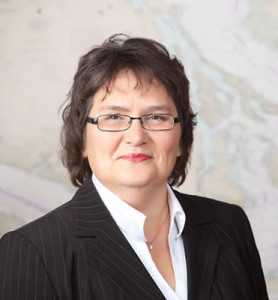County Auditor Milene Henley Explains The Top Two Primary
Posted August 2, 2016 at 5:14 am by Peggy Sue McRae

Milene Henley – Contributed photo
Many thanks to Milene Henley…
The Top Two Primary
– The eighth in a series of articles about elections in Washington State by San Juan County Auditor F. Milene Henley. The County Auditor administers elections and voter registration in the County.
Primary elections in Washington State are strange beasts. You know that, if you just voted in the August 2 primary. Long lists of candidates, strange party affiliations, and some, well, “eccentric” candidate statements. A lot of the strangeness derives from Washington’s unusual “Top Two” primary system, which requires candidates to state a preference for a party, or for no party, whether that party endorses them or not, and whether, in fact, that party even exists. (Who can forget the “Salmon Yoga” party?)
To understand primaries in Washington, it helps to look back at the history of primaries in the state. Before the Top Two primary, Washington had its popular “blanket” primary, enacted by a State Grange-backed initiative in 1934. The blanket primary put all candidates on one ballot, and allowed anyone, regardless of party, to vote for any candidate. Unlike the current “Top Two” primary, though, the highest Democratic and the highest Republican vote getters advanced to the general election, even if a second D or R got more votes.
Even so, the parties didn’t like the blanket primary, because it allowed voters to cross party lines to select general election candidates. A California lawsuit challenged the blanket primary in court, and in 2000, the U.S. Supreme Court ruled that the blanket primary was unconstitutional because it violated the parties’ right of association. A similar ruling followed in Washington.
The notorious “Pick-a-Party” primary ensued, in which voters had to choose whether to vote a Republican ticket or a Democratic ticket. The parties were happy, but no one else was. Washington voters, who have never had to declare a party when registering to vote, hated the Pick-a-Party. In response, the Legislature passed Top Two legislation in 2004, but then-Governor Gary Locke vetoed it. So the State Grange (again) took the idea to the voters in an initiative later that year, where it passed with nearly 60% of the vote.
Despite the vote, the Top Two system wasn’t put into place until 2008 because of attempts by the political parties to block it. It took a decision of the U.S. Supreme Court to allow it to go into effect. The current primary system skirts the “right of association” issue by not being a nominating system for the parties, but rather, allowing the top two candidates of any party – even if they are of the same party – to advance to the general election.
Top Two rules apply to all partisan races wholly within the State: that is, races for U.S. Senators and Representatives from Washington, state-wide positions, state legislative positions, and local legislative positions (if partisan). Although not subject to Top Two rules, non-partisan races – such as San Juan County’s Council members – operate much the same way as partisan races, in that the top two vote getters go to the general election.
(Partisan and non-partisan races differ, however, in that partisan candidates appear on the primary ballot even if unopposed. For non-partisan races, candidates appear on the primary ballot only if there are three or more candidates – that is, if there is a need to winnow the field down to two. Which explains why some one-party races appear on the primary ballot, and others do not.)
Lessons from Washington’s primary history: 1) Washington voters don’t like to be pigeon-holed. 2) If you like the Top Two Primary, you should love the Washington State Grange. And 3) listen to your mother when she tells you to “be careful what you wish for.”
You can support the San Juan Update by doing business with our loyal advertisers, and by making a one-time contribution or a recurring donation.
Categories: Around Here










No comments yet. Be the first!
By submitting a comment you grant the San Juan Update a perpetual license to reproduce your words and name/web site in attribution. Inappropriate, irrelevant and contentious comments may not be published at an admin's discretion. Your email is used for verification purposes only, it will never be shared.